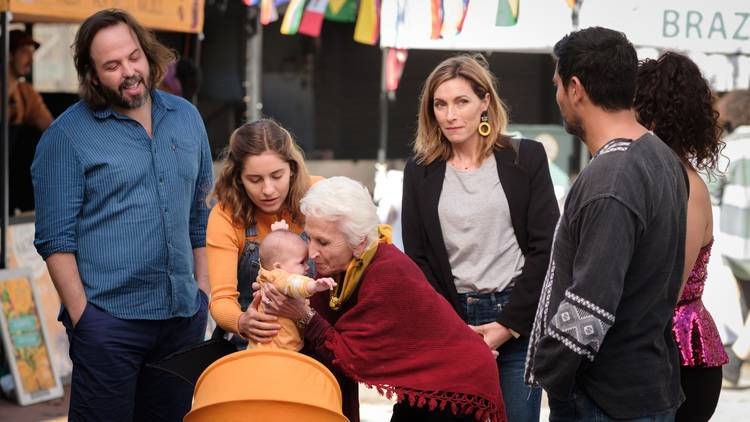BUMP Season 1 Review: Interestingly Australian for a US-style teen drama
- joshuajohnsmithe

- Mar 11, 2021
- 4 min read

(image courtesy of Stan)
BUMP doesn’t need to be an original Australian story to be a voice for Australian drama. But because the show walks down on a pretty well worn path of a story, it does need to be true to itself. And for the most part, it is.
BUMP follows the aftermath of the ultimate teenage nightmare. Oly, a year 11 girl (played by Nathalie Morris) whose identity is wrapped tightly around her intellect, suddenly faces childbirth from a concealed pregnancy. Oly’s life is uplifted as the baby begins to reshape her self-concept, but also creates a knock on effect of changing all the relationships in her life.
BUMP’s pilot is a gripping episode that continues to raise the stakes for the season. The episode opens with Oly having lost her toy Migallo, which becomes immediately insignificant as she goes into labour in the school bathroom, which is then trumped by her boyfriend Lachie’s blank faced question in the hospital room: “are you going to tell me who the father is?” With another turn, we discover that the baby’s father is the school jock, Santi (played by Carlos Sanson Jr) - whose own father is having an affair with Oly’s mum. Drama. The closing image of the pilot - Oly’s eyes hollow in the blue morning hospital light as she reaches down to her baby’s squirming fingers - is beautiful, and terrifying. The pilot is a great episode and in my view, is the best of the season.
BUMP isn’t a uniquely Australian story, but that’s what I like about it. It doesn’t shove Australian culture down our throats. Historically, some of our TV shows and movies have tried so hard to be classically 'Australian' that it feels like Australia couldn’t possibly be the target audience.
But with BUMP, the premise of the show isn’t far from the US show Jane the Virgin (in itself, a remake of a Venezuelan original): an academic girl falling pregnant against her knowledge, and consequently becoming romantically torn between the biological father and her prior love interest. So, BUMP really only has to be an example that Australians can associate with, and I think it does this somewhat well.
Unlike the theatrical style of telenovela that suits the US, Australians can relate to BUMP’s reserved displays of emotion that are more often deflected by humour in our culture. And the humour in the show is done well. Santi’s best friend Vince’s musings of the celestial are very welcome comedy. Because of this dramatic restraint, the characters’ vulnerable moments - like Dom pleading that his and Angie’s relationship doesn’t have to be over - are truly meaningful. These moments make me appreciate the quality of Kelsey Munro’s (and her team’s) writing.
BUMP also touches on some of Australia's issues with racism through the Hernandez's. As much as Oly's morality on social issues is a recurring part of the show, so is the family's contuining feeling of distance and exclusion. Angel remarks at one point, "As a latina, my experience is gringa's (white women's) racism can be more insidious because they hide it in this 'us sisters gotta be together' bullshit." It seems a very deliberate message to the audience that Oly's words alone have no meaningful impact on the people in her life.
Although, it’s not that BUMP hits the nail on the head with its display of Australian life. Not many households with a single parent’s teacher income can afford a home in inner Sydney, an Audi, and a boat. They also don't bring their teen-babies to school. It’s also disappointing that the show does occasionally play into American culture, using the Americanism “stoner jocks” to introduce characters Santi and Vince. But for the most part, BUMP does feel like it is for Australians, and that is refreshing.
What is confusing about BUMP is the characterisation - and relationship - at the centre of the show. Oly’s character is made interesting by the challenge that her Sorpresa poses to her sense of self. One element to this is that Oly can no longer pretend that she doesn’t demand help from others. From her parents, from her best friend Reema, or even from Lachie - whom she cheated on, but doesn’t seem to meaningfully recognise. What this means is that Oly is presented as somewhat unlikeable. Compare this to Santi, who is archetyped as the dumb jock, but classically offset with a creative side and a wound of his mother having died to make him likeable. Very quickly, I feel as if I already know everything there is to know about Santi. As a result, it feels as though BUMP has made Oly interesting, but not likeable. Santi, likeable, but not interesting. The show also does not explain why Oly went immediately from almost losing her virginity with Lachie, straight into bed with Santi at a party, with absolutely no shame. This confusing and seemingly shallow partnership makes me wonder how much legs the show will have with Oly and Santi’s relationship as the dominating plot. I am interested to see the development of other relationships more than this one, like Oly’s parents. BUMP is released at a strange time, and it is interesting to get a glimpse of TV at a time that falls in the gap between the pandemic as something that has happened in the past, but isn’t quite gone. We are cleverly reminded of this in the final episode when Dom laughingly greets the christening afterparty guests with elbow bumps as they lean in for hugs and kisses. I love to see Australian TV doing well, so I’m glad to see BUMP renewed for a second season. If not for my interest in Oly and Santi, then for the prospect of a romance between Vince and Reema.


